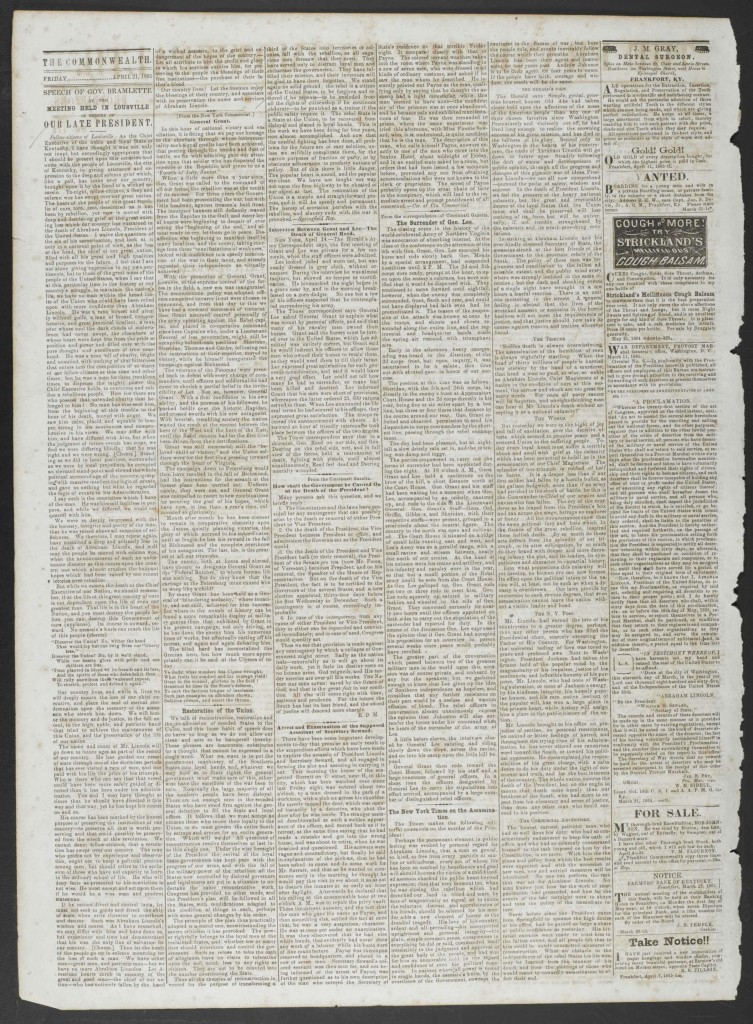By Tony Curtis & Patrick Lewis
On April 18, 1865, Thomas E. Bramlette, Governor of Kentucky, gave a speech at a meeting held in Louisville, Kentucky, “in memory of our late president.” Bramlette often found his political sentiments in conflict with the policies of the Lincoln Administration, but in this oration he reconsidered Lincoln the man and the president, offering Kentucky and the United States words of solitude, gratitude and remembrance.
Enjoy the following excerpts from Bramlette’s speech and an image of the reproduced speech from the April 21, 1865 The Frankfort Semi-Weekly Commonwealth. The full issue of this issue of The Frankfort Semi-Weekly Commonwealth and other Kentucky newspapers can be viewed at http://kdl.kyvl.org/.
“I feel that I am not alone giving expression to my own sentiments, but to those of the great mass of the people of the United States, when I say that at this particular time in the history of our country a struggle to maintain the nation’s life, we have no man within the broad limits of the Union who could have been relied upon with more confidence than Abraham Lincoln. He was a man honest and utterly without guile, a man of broad, comprehensive, and great practical intellect; a man over whose soul the dark clouds of malevolence had never swept, the chambers of whose heart were kept free from the pride of position and power and filled only with the pure thought and excellence of true manhood. He was a man full of charity, bright and unsullied, with nothing of that bitterness that enters into the composition of so many of our fellow-citizens at this time and other times; but he was a man for these troublous times, to dispense the mighty power the Chief Executive holds, to overcome and subdue a rebellious people. How few there are who possess that extended charity that belonged to him! No man has ever seen him, from the beginning of this trouble to the hour of his death, moved with anger. We saw him calm, placid, and equable in temper, strong in his sentiments and comprehensive in his views. We may differ with him, and have differed with him, but when the judgment of future events has come, we find we were differing blindly; that he was right and we were wrong. [Cheers.] Standing as we did in local positions, surrounded as we were by local prejudices, he occupied an elevated stand-point and viewed the whole political surroundings of the country, grasping with massive intellect the logic of events, and gave us nothing but what he regarded the logic of events in his Administration.
I say such is the conviction which I have of the man. He was himself faultless in purpose, and while we differed, we could not quarrel with him.”
“The name and cause of Mr. Lincoln will go down to future ages as part of the record of our country. He has guided our vessel of state through one of the stormiest periods that has ever visited a race of men, and has paid with his life the price of his triumph. Who is there who can say that that vessel could have been more safely guided or directed than it has been under his administration. You and I may have thought at times that he should have directed it this way and that way, yet he has kept his course on and on.”
“If he cannot divert and control facts, he must not seek to guide and direct the ship of state, when evils threaten to overthrow and destroy. Such was Abraham Lincoln’s wisdom and course. As I have remarked, we may differ with him and have done so, but experience and time has demonstrated that his was the only line of salvation for our country. [Cheers.] Then let the heart of the people go up in solemn mourning for the loss of such a man. We have other men—great men and patriotic men—but we have no more Abraham Lincolns. Let American hearts throb in memory of the great and good man—the chief of our nation—who has untimely fallen by the hand of a wicked assassin, to the grief and endangerment of the hopes of the country.—Let us all attribute to him the credit and glory to which his service entitles him, for preserving to the people the blessings of their free institutions—the purchase of their fathers’ blood.
Our country lives! Let the freemen enjoy the blessings of their country, and associate with its preservation the name and services of Abraham Lincoln.”

